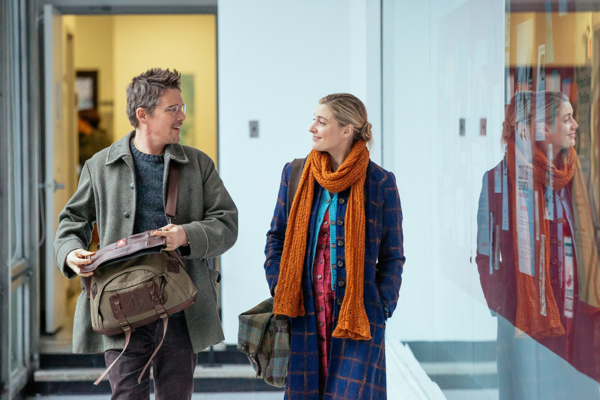Movie review by Greg Carlson
Based on a story by Karen Rinaldi, Rebecca Miller’s adaptation of “Maggie’s Plan” imagines the intellectual, white, fairytale New York City familiar to Woody Allen fans as the backdrop for a screwball-inspired comedy of amour fou and remarriage. Featuring Greta Gerwig as the young woman who comes between, and then determines to reunite, academics Julianne Moore and Ethan Hawke, “Maggie’s Plan” covers little that hasn’t already been thoroughly examined by Allen during his lengthy career. The results, however, are lighthearted, warm, and observant. Gerwig, in particular, continues to build a strong case for her star’s ascendance, riffing on the charming persona that has emerged onscreen in the last five years.
With a wardrobe to die for, Gerwig’s Maggie, who offers guidance to graduating collegians as they prepare to leave the school nest, is a fastidious planner. Organized to a fault, her decision to become a mother sets up a comic encounter with “pickle entrepreneur” Guy (blissed-out Travis Fimmel), an acquaintance who agrees to serve as the sperm donor. In what could be read as one of several plans explored during the plot-happy proceedings, the slapstick insemination telegraphs an obvious outcome saved for the movie’s denouement. As a classic secondary storyline, Guy recedes into the background, even though Fimmel surely deserves at least one more solid exchange along the way.
Instead, Miller’s focus turns to Maggie’s affair with ficto-critical anthropologist (cue groans) John, whose spouse Georgette is a Columbia superstar. As Georgette, Moore tries on an initially distracting Danish accent that hides some of her character’s vulnerabilities, but as usual, the gifted performer soon wins over the skeptical. Like Maggie, viewers eventually come to appreciate the complementary dimensions of John and Georgette – especially during the execution of Maggie’s contrivance to patch up the couple at a Slavoj Zizek-headlining conference at a beautiful Quebecois ski resort so impossibly cool that Kathleen Hanna performs “Dancing in the Dark” after the lectures.
Certainly, the best parts of “Maggie’s Plan” comment on the entrenched patriarchal systems that allow John to take for granted the overworked and underappreciated Maggie, who manages the bulk of caregiving, feeding, and shuttling their daughter and John’s two children with Georgette. Miller stylistically mirrors the chaotic rhythms of post-divorce scheduling, and in a large ensemble filled with recognizable performers including Maya Rudolph and Bill Hader, the filmmaker coaxes some lovely moments from the kids, especially surly teenager Mina Sundwall and scene-stealing tot Ida Rohatyn (daughter of the movie’s composer Michael Rohatyn).
In her review of the film, April Wolfe wonders, “Will Greta Gerwig have to do a quirky solo dance scene in every movie she’s in? Because that’s quickly becoming the case.” The quip alludes to a kind of typecasting – as Wolfe puts it, “the adorably inept almost-a-grown-up” – that represents aspects of Gerwig’s work in her collaborations with Noah Baumbach and many of her other movies. Certainly the actor is capable of breaking free of the image, and many admirers look forward to that moment. Even so, it is difficult if not impossible to scowl at Maggie – a woman so determined to set things right in the universe that she selflessly orchestrates what she believes is the best possible outcome to her own failed romance.
